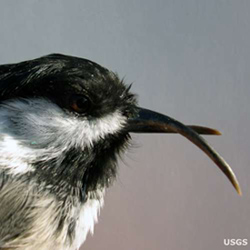Earth’s Lakes Warming Due to Climate Change

Lake Tahoe, seen here from Emerald Bay, was one of the primary validation sites for the global lake study. The lake, which straddles the borders of California and Nevada, is the largest alpine lake in North America. Image credit: NASA-JPL
WASHINGTON – In the first comprehensive global survey of temperature trends in major lakes, researchers have determined that Earth’s largest lakes have warmed during the past 25 years in response to climate change.
Philipp Schneider and Simon Hook of NASA’s Jet Propulsion Laboratory in Pasadena, Calif., used satellite data to measure the surface temperatures of 167 large lakes worldwide.
They reported an average warming rate of 0.45 degrees Celsius (0.81 degrees Fahrenheit) per decade, with some lakes warming as much as 1 degree Celsius (1.8 degrees Fahrenheit) per decade. The warming trend was global, and the greatest increases were in the mid- to high-latitudes of the Northern Hemisphere. (more…)

